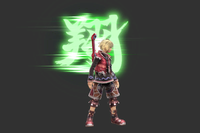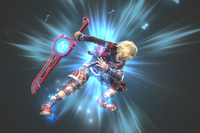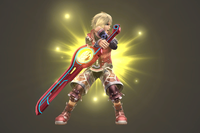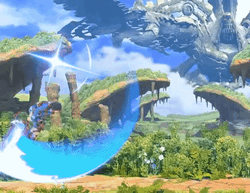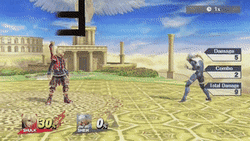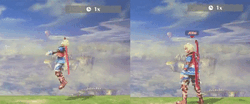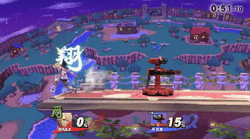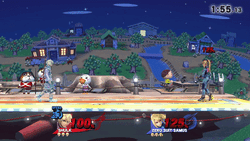Monado Arts: Difference between revisions
m (Clarified terminology, using "Up Special move" instead of "Up B" move, since button-command assignments can differ with controller designations.) |
TremendoDude (talk | contribs) (→Buffered deactivation: Adjusted misinfo; Deactivating to get more air time still works on grounded jumps, just not buffered from the ground.) Tag: Mobile edit |
||
| (245 intermediate revisions by 73 users not shown) | |||
| Line 1: | Line 1: | ||
{{articleIcons|ssb4=y}} | {{articleIcons|ssb4=y|ssbu=y}} | ||
{{Infobox Special Move | {{Infobox Special Move | ||
|name=Monado Arts | |name=Monado Arts | ||
|image=[[File:Shulk | |image=[[File:Shulk Neutral B SSBU.gif|300px]] | ||
|caption= | |caption=Browsing to select an art in ''Ultimate''. | ||
|user= | |user=[[Shulk]] | ||
|universe={{uv|Xenoblade}} | |universe={{uv|Xenoblade Chronicles}}<!-- | ||
|interwiki=xenoserieswiki | |||
|interwikiname=Xeno Series Wiki | |||
|interwikipage=Monado Art--> | |||
}} | }} | ||
'''Monado Arts''' ({{ja|モナドアーツ|Monado Ātsu}}, ''Monado Arts'') is | '''Monado Arts''' ({{ja|モナドアーツ|Monado Ātsu}}, ''Monado Arts'') is [[Shulk]]'s [[neutral special]] move. | ||
==Overview== | ==Overview== | ||
Each of the five Arts is indicated by a colored {{s|wikipedia|kanji}} character. When the special button is pressed, a character will appear behind him, beginning with Jump and following the order of Speed, Shield, Buster, and Smash for each consecutive press. | Shulk has access to five Arts: Jump, Speed, Shield, Buster, and Smash. They provide passive buffs, altering Shulk's attributes. Only one can be active at a time. | ||
{|class="wikitable | |||
Each of the five Arts is indicated by a colored {{s|wikipedia|kanji}} character. When the special button is pressed, a character will appear behind him, beginning with Jump and following the order of Speed, Shield, Buster, and Smash for each consecutive button press. In ''[[Super Smash Bros. Ultimate]]'', Arts can also be "quick-selected" by holding down the special button, moving the directional stick to the Art, then releasing the special button. While an Art is active, several of Shulk's attributes are modified for the duration of its effect, which vary based on the Art chosen. | |||
{{clr}} | |||
{|class="wikitable" | |||
|- | |- | ||
!Kanji!!Monado Art!!Color!!Affected stats!!Activation pose | !Kanji!!Monado Art!!Color!!Affected stats!!Activation pose | ||
|- | |- | ||
|<big>{{ja|翔|Shō}}</big>* | |<big>{{ja|翔|Shō; lit. Soar}}</big>* | ||
|Jump ({{ja|ジャンプ|Janpu}}) | |||
|Green | |||
| | |||
*{{buff|Increased jump height (2×), ledge jump height (1.3×), air speed (1.5× {{GameIcon|4}}, 1.7× {{GameIcon|ssbu}}), gravity (1.3× {{GameIcon|4}}, 1.4× {{GameIcon|ssbu}}), and Air Slash height (1.3× {{GameIcon|4}}, 1.5× {{GameIcon|ssbu}})}} | |||
*{{nerf|More damage taken (1.22× {{GameIcon|4}}, 1.3× {{GameIcon|ssbu}})}} | |||
*{{change|Increased falling and fast falling speed (1.22× {{GameIcon|4}}, 1.4× {{GameIcon|ssbu}})}} | |||
Monado Jump greatly improves aerial mobility at the cost of lowered defense. It improves air speed, air acceleration, and jump height, and increases the upwards travel distance of Air Slash. With Jump active, Shulk's recovery and edgeguarding both become far stronger. He can recover from a much greater distance, and equivalently, he can go further offstage to chase opponents. Higher air mobility helps with both evading edgeguard attempts when recovering, and chasing down his opponents' evasion attempts when edgeguarding. Jump also improves Shulk's combos: in general, he is much more able to quickly follow opponents after launching them away. (For example, in ''Smash 4'', an up throw followed by an up aerial can become a 50-50; this setup is known as the [https://www.youtube.com/watch?v=QqYkLTx-eRU Monado Purge]). Jump's great strengths come with high risk: its has more severe damage vulnerability than any other Art. However, because it increases gravity, it marginally improves his survivability against vertical attacks. In ''Ultimate'', this Art lasts for 6 seconds with a cooldown time of 18 seconds. | |||
|style="text-align:center"|[[File:ShulkJumpActivationPose.JPG|200px]]<br>Holds his hand in the air | |||
|- | |- | ||
|<big>{{ja|疾|Shitsu}}</big>* | |<big>{{ja|疾|Shitsu; lit. Rapid}}</big>* | ||
|Speed ({{ja|スピード|Supīdo}}) | |||
|Blue | |||
| | |||
*{{buff|Increased walk speed (1.7×), initial dash speed (1.7× {{GameIcon|4}}, 2× {{GameIcon|ssbu}}), run speed (1.7× {{GameIcon|4}}, 2× {{GameIcon|ssbu}}), dash attack travel speed (1.5× {{GameIcon|ssbu}} only) and air speed (1.3× {{GameIcon|4}}, 1.4× {{GameIcon|ssbu}})}} | |||
*{{nerf|Less damage dealt (0.8× {{GameIcon|4}}, 0.7× {{GameIcon|ssbu}}), lower jump height (0.77× {{GameIcon|4}}, 0.7× {{GameIcon|ssbu}})}} | |||
*{{change|Higher gravity (1.2× {{GameIcon|ssbu}} only), higher traction (1.5× {{GameIcon|4}}, 2× {{GameIcon|ssbu}})}} | |||
An Art that improves Shulk's approach and spacing options, short hops, and overall combo ability, but lowers his overall damage output. More efficient short hops allow Shulk to space much more effectively, and a better approach speed makes this Art a good combo starter against slower characters. Decreased damage means more attacks have to land to compensate for the speed boost, but Speed's overall mobility allows the player to trap opponents with barrages of covering short-hop aerial attacks, approach quickly to punish with a grab, as well as weave in-and-out of attacks in order to bait reactions. Lowered traction significantly improves his [[pivot grab]] range (becoming the third longest in the game, tied with {{SSB4|Meta Knight}}), but it also leaves him highly punishable when coming to a stop. Lowered jump height can be an issue if recovering vertically, but the speed boost applies to Shulk's air speed as well, allowing him to quickly get close to the stage before either getting in the proper distance/height for Air Slash to sweetspot the ledge, or changing to Jump to help his recovery. Like Jump, the Speed Art can initiate a Fair Slash combo at certain percentages. In ''Ultimate'', this Art lasts for 8 seconds with a cooldown time of 16 seconds. | |||
|style="text-align:center"|[[File:ShulkSpeedActivationPose.JPG|200px]]<br>Leans forward, ready to run | |||
|- | |- | ||
|<big>{{ja|盾|Tate}}</big> | |<big>{{ja|盾|Tate}}</big> | ||
|Shield ({{ja|シールド|Shīrudo}}) | |||
|Yellow | |||
| | |||
*{{buff|Less knockback taken (0.78× {{GameIcon|4}}, 0.6× {{GameIcon|ssbu}}) and damage taken (0.67× {{GameIcon|4}}, 0.5× {{GameIcon|ssbu}}), higher shield health and regen (1.5× {{GameIcon|4}}, 2× {{GameIcon|SSBU}})}} | |||
*{{nerf|Lower jump height, air speed, and movement speed (all 0.6×), less damage dealt (0.7× {{GameIcon|4}}, 0.5× {{GameIcon|ssbu}}), and less knockback dealt (0.8× {{GameIcon|ssbu}} only)}} | |||
An Art focused on defense and survivability, but it cripples movement speed, damage output, and recovery. Monado Shield is considerably useful to retain a percentage lead or stall matches, as Shulk can survive to extreme percentages. The reduced knockback disrupts enemies' usual combos. Monado Shield also increases Shulk's shield health, making it more much more durable and difficult to break under normal circumstances unless it was already small when the Art was activated; with Monado Shield active, Shulk's shield is able to withstand normally shield-breaking attacks such as a fully-charged [[Shield Breaker]] or both hits of [[Bowser Bomb]], provided it is at full health. As this Art reduces knockback, it has some beneficial gimmicks in certain situations, such as being able to airdodge out of [[Mewtwo]]'s forward throw at low percents, and reducing the amount of time Shulk gets stunned by [[Disable]] even at high percents. Shield's reduced damage and mobility makes it difficult to gain a percentage lead, but this is compensated by Shield reducing damage and knockback taken, allowing Shulk to chip at cornered opponents with a lower concern of damage taken, while even being capable of escaping percent-specific combos. However, it is highly advised to switch out of Shield while recovering, as it significantly hinders his aerial movement. In ''Ultimate'', this Art lasts for up to 6 seconds with a cooldown time of 18 seconds. Taking damage while in this mode will shorten its duration. | |||
|style="text-align:center"|[[File:ShulkShieldActivationPose.JPG|200px]]<br>Crosses his arms in a defensive pose | |||
|- | |- | ||
|<big>{{ja|斬|Zan}}</big>* | |<big>{{ja|斬|Zan; lit. Slash}}</big>* | ||
|Buster ({{ja|バスター|Basutā}}) | |||
|Purple | |||
| | |||
*{{buff|More damage dealt (1.4×)}} | |||
*{{nerf|More damage taken (1.13× {{GameIcon|4}}, 1.3× {{GameIcon|ssbu}})}} | |||
*{{change|Less knockback dealt (0.68× {{GameIcon|4}}, 0.65× {{GameIcon|ssbu}})}} | |||
An Art that allows Shulk to deal high damage in a short amount of time while lowering his KO power and damage defense. His throws open up highly-damaging combo opportunities (especially on heavyweights), and the increase in damage output also makes his attacks deal increased shieldstun and shield damage, making him less prone to shield grabs and allows him to more easily break shields. A notable shield break combo is a MALLC back air into reversed forward smash. However, his KO power becomes extremely low, and this Art makes Shulk incredibly vulnerable to damage, which can easily send his percentage up significantly if he is careless, discouraging reckless use. In ''Ultimate'', this Art lasts for 10 seconds with a cooldown time of 14 seconds, giving it both the longest duration and shortest cooldown time of all five Arts. | |||
|style="text-align:center"|[[File:ShulkBusterActivationPose.JPG|200px]]<br>Holds the Monado in front of him, much like his down taunt | |||
|- | |- | ||
|<big>{{ja|撃|Geki}}</big>* | |<big>{{ja|撃|Geki; lit. Attack/Strike}}</big>* | ||
|Smash ({{ja|スマッシュ|Sumasshu}}) | |||
|Red | |||
| | |||
*{{buff|More knockback dealt (1.18× {{GameIcon|4}}, 1.25× {{GameIcon|ssbu}})}} | |||
*{{nerf|Less damage dealt (0.5× {{GameIcon|4}}, 0.3× {{GameIcon|ssbu}}), more knockback taken (1.07× {{GameIcon|4}}, 1.2× {{GameIcon|ssbu}})}} | |||
An Art used to improve Shulk's KO options and edgeguarding potential, which reduces Shulk's damage output, but also makes most of his moves viable KO moves at under 100%. For example, his smash attacks can KO as early as 70% even when uncharged. Shulk's down throw also becomes the strongest down throw in ''Smash 4'', while in ''Ultimate'', his forward throw and back throw become one of the strongest. Smash also allows Shulk to mess up certain throw combos at lower percents (e.g. Sheik and [[Diddy Kong]]) by launching him slightly further than normal. However, due to the reduced damage, [[shieldstun]] and [[hitlag]] are reduced as well, and thus makes all of his attacks even more punishable on shield, while Shulk's survivability becomes as low as Mewtwo's for the Art's duration. In ''Ultimate'', this Art lasts for 8 seconds with a cooldown time of 16 seconds. | |||
|style="text-align:center"|[[File:ShulkSmashActivationPose.JPG|200px]]<br>Points the Monado to the sky | |||
|} | |} | ||
<nowiki/>*Barring "shield", all of the Japanese kanji are stylized in different English translations than what they actually translate to. | |||
When an Art is activated, colored auras appear in areas of Shulk's body that pertain to the effect of the Art itself. For example, Jump and Speed have an aura around Shulk's shoes, while Buster's aura will appear around the Monado. Shield's aura will appear around Shulk's body and Smash's aura appears around Shulk's hands. Also, in the Wii U version, the Art's kanji appears at the top left corner of Shulk's portrait (which blinks faster and faster when the Art is almost ready to deactivate), and Shulk additionally gains a colored trailing aura effect while he moves. | |||
Also, for all Arts in the Japanese version, Shulk yells out for each respective one: {{ja|跳ぶ!|Tobu!}} (Leap!), {{ja|走る!|Hashiru!}} (Run!), {{ja|守る!|Mamoru!}} (Protect/Defend!), {{ja|叩く!|Tataku!}} (Thrash!), {{ja|ふっ飛ばす!|Futtobasu!}} (Fly away!) | |||
===Activation, duration and effects=== | |||
[[File:Shulk SSBU Skill Preview Extra 1.png|thumb|All of Shulk's Monado Art options as shown by the [[Move List]] in ''Ultimate''.]] | |||
To activate an Art, the special button must not be pressed for a few frames until the colored aura appears on Shulk. While scrolling through the Arts, he will be unable to perform any other special moves until one is activated, although Shulk can still move, dodge and attack normally. In ''Ultimate'', it can also be "quick-selected" by holding down the special button, holding the directional stick mapped to the Art, then releasing the special key. The "quick select" wheel is mapped to the following: up for Smash, upper left for Jump, lower left for Speed, upper right for Buster, and lower right for Shield. If Shulk activates an Art while staying still, he poses and announces the activated Art's name upon activation. | |||
In ''SSB4'', each Art lasts for 15 seconds before stats return to normal. In ''Ultimate'', all Arts last for less time, with Buster lasting for 10 seconds, Speed and Smash lasting for 8 seconds, and Jump and Shield lasting for only 6 seconds (with Shield Art's duration also draining a slight amount every time Shulk gets hit while the Art is active). The Arts can be cancelled by pressing the special button three times in succession, or, in ''SSB4'', by holding down the special button for about one full second. Additionally, they will be canceled instantly when the user is hit by the initial rush of [[All-Out Attack]]. In ''SSB4'', once an Art activates or is canceled early, it cannot be activated again until 10 seconds have passed. In ''Ultimate'', each Art has its own cooldown time, with Jump and Shield taking 18 seconds, Speed and Smash taking 16 seconds, and Buster taking 14 seconds. Before then, its corresponding kanji will be grayed out when selecting another Art. The cooldown on all Monado Arts resets when Shulk is [[KO|knocked out]]. No two Monado Arts can run at the same time; if one is active, and a different Art is chosen, the previous Art is overwritten and enters cooldown. | |||
Each Monado Art also affects Shulk's attacking power with battering items like the [[Beam Sword]] (e.g. Smash reduces hitlag and damage while increasing knockback). However, they do not affect firing weapons like the [[Ray Gun]] or thrown items such as the [[Capsule]]. | |||
Shulk's [[Final Smash]], [[Chain Attack]], is also affected by the Monado Arts. With Buster, this attack becomes highly damaging, often sending the opponent into KO percents if the Art lasts the duration of the full attack, but cannot KO as effectively. With Smash, Shulk can KO at significantly earlier percents but, should the attack not clear the stock, Shulk will have hardly done as much damage to the opponent as desired, making it arguably riskier than with Buster. Speed and Shield will only reduce its effectiveness while Jump has no effect whatsoever. The Arts can run out in the middle of the Final Smash, so awareness of their durations and the situation is advised. In addition, the neutral special input will activate the Final Smash, and thus the desired Art to use during Chain Attack must be chosen beforehand. However, Monado Arts can be accessed even with a Final Smash on standby; Shulk must hold the button down while in aerial landing lag. | |||
==Instructional quotes== | |||
{{InstructionalQuotes | |||
|ssb4-3char=Shulk | |||
|ssb4-3desc=Press {{Button|3DS|B}} to cycle through Arts. Arts increase particular stats. | |||
|ssbuchar=Shulk | |||
|ssbudesc=Switches Arts—each has a different advantage. Can be switched by holding or pressing repeatedly. | |||
}} | |||
==Technical data== | |||
Arts can be cancelled, scrolled through, or changed several frames after [[hitstun]] occurs, and can be [[buffer]]-canceled during an action such as a [[throw]], jump, landing lag and landing from [[helplessness]]. | |||
The animation of Shulk announcing the Art's name grants 14 frames of [[intangibility]] (unless canceled into another action), and Shulk will [[perfect shield]] any attack that connects with his body during that period should he raise his shield. It will also replace landing lag animations (reducing it to 5 frames). These factors make it possible to perform multiple [[advanced technique]]s, most notably the {{h2||Monado Art landing lag cancel}}. | |||
===Kirby's [[List of Copy Abilities|Copy Ability]]=== | |||
[[Kirby]] is able to copy the Monado Arts with his {{b|Inhale|Kirby}} and can receive effects from these Arts when he uses this Copy Ability. This can give Kirby incredible benefits and new previously-unseen options, as Jump gives him high jumps that can easily pass the upper blast line after three jumps and, as a result, can extend his throw combos to pursue his opponent. Buster can trap opponents in a string of attacks far past realistic KO percentages; particularly his up tilt which can [[juggle]] most characters for longer than usual to rack up large amounts of damage. Speed also gives Kirby the longest [[perfect pivot]] in the game. Conversely, both Speed and Shield make Kirby's jumps the most ineffective in the game, and Smash makes him the lightest fighter in the game. And unlike Shulk, Kirby's up special moves gain no benefit from the Jump Art. | |||
Like Shulk, Kirby's [[Ultra Sword]] Final Smash can be affected by the Monado Arts in all of their respective ways to alter its damage and knockback properties. Despite having his own version of the Monado, Kirby does not use it to directly attack his opponent whatsoever, nor does he gain a unique hat from it. | |||
Even though Kirby's Monado Arts only gives him massive versatility against a Shulk in 1v1 matches, a Kirby/Shulk team in Doubles with Team Attack turned on can easily allow both characters to use such versatile techniques in tandem. | |||
==Customization== | ==Customization== | ||
Special Move customization was added in ''[[Super Smash Bros. 4]]''. These are the | Special Move customization was added in ''[[Super Smash Bros. 4]]''. These are the variations: | ||
{{CustomSet|Shulk|Neutral|name1=Monado Arts|desc1=Activate one of five different Arts, each of which provides a different advantage.|name2=Decisive Monado Arts|desc2=Activate stronger Arts that last longer. However, they can't be canceled once used.|name3=Hyper Monado Arts|desc3=Your | {{CustomSet|Shulk|Neutral|name1=Monado Arts|desc1=Activate one of five different Arts, each of which provides a different advantage.|name2=Decisive Monado Arts|desc2=Activate stronger Arts that last longer. However, they can't be canceled once used.|name3=Hyper Monado Arts|desc3=Your arts are much stronger, but the drawbacks are too. Doesn't last as long.}} | ||
# '''Monado Arts''': Default. | # '''Monado Arts''': Default. | ||
# '''Decisive Monado Arts''': Arts last for 5 more seconds | # '''Decisive Monado Arts''': Arts last for 5 more seconds, recharge 5 seconds sooner, and boosts positive effects of Arts, but once an Art is activated, it cannot be canceled or changed for another Art. A slightly longer pause is added before an Art becomes active, allowing the user to consider whether they want to be temporarily stuck with an Art. This allows the user to take advantage of a specific art for much longer, at the cost of the inability to switch Arts once it becomes disadvantageous. As a side effect, the inability to change Arts also prevents effective usage of Art-based techniques, namely the ones mentioned in the section above. | ||
# '''Hyper Monado Arts''': Both positive and negative effects of Arts are amplified, but the Arts have a shorter duration | # '''Hyper Monado Arts''': Both positive and negative effects of Arts are amplified, but the Arts have a shorter duration of 5 seconds. Recharging will also take 5 seconds longer. Becomes a short-duration, high risk and reward ability, as the strengths and weaknesses of each Art become some of the most extreme in the game: an example is Hyper Buster, which makes Shulk's moves immensely more damaging than even {{SSB4|Ganondorf}}'s, but reduces his KO power to almost nothing even at high percents. | ||
==Techniques== | |||
Shulks's Monado Arts, while simple in execution, holds numerous [[Advanced_technique#Shulk|advanced techniques]]. These tend to make use of the activation and deactivation animations for expanded movement options that make attacks and approaching safer. These techniques all have unique uses and execution, although they vary in viability. Monado Arts' advanced techniques are a mainstay in Shulk's [[metagame]] for their strong reward if executed in the right situation, such as speed boosts, [[intangibility]], and relatively easy rushdown capabilities in game state. However, if executed poorly, they may have severe consequences due to the drawbacks of certain Monado Arts leaving Shulk vulnerable while active. Via copy ability, [[Kirby]] is able to make use of all Monado Art advanced techniques as well. | |||
Some techniques are exclusive to or work differently in ''Smash 4'', as the engine differences and Shulk-specific changes in the transition to ''Ultimate'' made these techniques impossible. These game-exclusive techniques will be labeled when appropriate. | |||
{{clr}} | |||
===Buffered deactivation=== | |||
'''Buffered deactivation''' (often shortened to '''BD''') is a technique that allows Shulk to exploit unique interactions caused by the deactivation of a Monado Art between moves, such as transitioning speeds between Arts, enabling combos that would not otherwise be possible, or enhancing existing combos. By pressing neutral special three times to deactivate Shulk's current Art and timing the third press so that it occurs at least 30 frames before Shulk is in a state where he can cycle Monado Arts, the Art will deactivate the moment Shulk is in a cyclable state. | |||
In both ''Smash 4'' and ''Ultimate'', buffered deactivation allows Shulk to situationally optimize certain combos, increasing their effectiveness. For example, by turning off Buster Art (or Shield Art in ''Ultimate'') during a combo, the next move will be performed without Buster Art active, which will increase its knockback significantly, potentially making attacks that are unsafe on hit safer or turning the combo into a [[kill confirm]]. Similarly, Shulk can deactivate Speed Art or Shield Art after landing a combo starter to deactivate the Art's reduced damage output, increasing the combo's damage overall. Turning off Shield Art can also allow for some combos that wouldn't otherwise be possible by nullifying the speed reduction of the Art, allowing for greater reach. | |||
Buffered deactivation can also be used to enhance Shulk's jump height if Monado Jump is deactivated as Shulk jumps. This is due to Shulk keeping Monado Jump's increased [[jump]] height, but not the increased [[falling speed]], causing him to travel higher and stay in the air longer. This allows Shulk greater reach and increased air time when edge guarding or chasing opponents into the air. In ''Smash 4'', this technique can boost the height of any jump, and is pivotal for the '''Monado Purge''' [[50-50|50/50]] setup (up throw to jumping up aerial), as the extra height extends the setup's effective percent range. Though the technique also works in ''Ultimate'', deactivating Jump Art during the early frames of a full hop will fail to change the jump's properties (due to all changes being overwritten by the full hop's own natural jump boost). | |||
In ''Smash 4'', buffered deactivation (previously known as '''Monado Art buffered deactivation''' or '''MABD''') allows Shulk to retain his jumping, walking and/or running speed immediately after canceling an Art. Buffered deactivation was originally discovered by [https://www.youtube.com/watch?v=XoFGAuRFPJY Erico9001], who also researched that it boosts Shulk's jump height [https://www.youtube.com/watch?v=ES_-r2A6grI here]. Performing this requires the player to buffer-cancel an active Monado Art during an uninterruptible animation (i.e dropping shield or dodging), while also buffering a movement option during that time. If successful, the Art will cancel, but Shulk will technically begin moving before the Art disappears, causing him to gain the increased movement speed that is provided by the Art until another command is inputted. However, any movement speed gained will slowly change back to the default speed after a while: in the case of running, Shulk will initially start at the speed of Monado Speed or Monado Shield and then either slow down or speed up, respectively. The effect will last until Shulk does another action, such as an attack. This has several uses, including fakeouts or doing attacks/combos that requires Monado Speed's mobility without being penalized by its lower damage. In ''Ultimate'', the bug which allowed Shulk's movement properties to transfer through deactivation was removed (Shulk will now immediately change all his attributes the instant he switches or deactivates an Art). | |||
{{clr}} | |||
===Dial storage=== | |||
[[File:Dial_Storage_tech.gif|250px|thumb|Shulk buffers the Monado Arts dial during the landing lag of forward aerial (indicated by the body flash). This "uses up" the dial's 10 frame startup lag, and the second use of the dial is instantaneous.]] | |||
'''Dial storage''' is an ''Ultimate'' exclusive advanced technique which allows Shulk to bypass up to 10 frames of startup lag when using the Monado Arts dial wheel. It is named as such due to a technical quirk that allows the initial frames of the Monado dial to be "stored up" before its next use, much like a [[charge]] move. | |||
To use dial storage, the player must hold the special button while in a chargeable state (ie: while idle, during landing lag, or in hitstun) and release the button or interrupt the charge with an attack, [[grab]], jump squat, or a [[taunt]] before the Monado Art dial activates. This will pause the charge, storing however many frames the dial was charged for. (A "flash" effect around Shulk's torso can be used as a visual aid to see how many frames were charged.) Though starting to charge again while in a chargeable state or successfully opening the Monado Art dial resets the current charge, buffering the dial charge out of an unchargeable state (ie: any action that prevents Shulk from switching Arts) or during an action’s [[interruptibility]] frames allows Shulk to access that stored charge, resuming the charge from where he left off. | |||
If done correctly, Shulk's next use of the Monado Art dial will have its startup lag reduced by however many frames were charged in advance. As the dial appears at frame 11, this technique can cut out up to 10 frames from the time it takes to open the dial, with a maximum of having no startup frames at all when all 10 frames are charged up. Using dial storage, Shulk can open the dial instantly, allowing him to reduce the landing lag of an aerial attack or airdodge to as low as 7 frames (by flashing the dial without selecting an Art), switch Arts almost instantly (gaining up to 14 frames of [[intangibility]]), escape or switch to Shield Art during certain multi-moves, or use a directional [[air dodge]] as an escape or movement option with minimal landing lag. These situations may otherwise be impossible to escape from when using the standard dial switch (which has 11 frames of startup lag). Dial storage can also be used to switch Arts almost immediately between combo hits, allowing a wide variety of transitional combos between different Arts; this includes potent KO combos like leading Buster Art moves into Smash Art finishers, or mid-combo Art switches that extend strings with boosted mobility and/or increased damage. | |||
Freely charging the dial (ie: charging without a timed setup) can quickly prepare dial storage for use on the fly, which can be done while cycling or deactivating Monado Arts, before attacking, or slipped in after an Art activates. Landing with a [[forward aerial]] or a neutral air dodge while holding the special button and buffering an input during landing lag to interrupt the charge can also be used as a practical setup to guarantee a maximum dial charge, buffering the charge during those moves' 10 frames of landing lag. | |||
This technique can be used much like Shulk's {{h2||Monado Art landing lag cancel}}. However, the applications of this technique are far more versatile and can be used more aggressively, mostly due to the reduced utility of MALLC. In comparison, dial storage is more flexible as it doesn't require airtime nor a timed landing, and can be used in any Art (MALLC requires no Arts to be active). However, MALLC has no vulnerability when landing (dial storage suffers from 3 frames of vulnerability during the "fuzzy window" which allows Arts to be chosen). Overall, both techniques can be used for different situations. | |||
<gallery> | |||
Dial_storage_shield.gif|Shulk with a "stored" dial, using it to instantly switch to the Shield Art in order to weaken the second hit of {{SSBU|Zero Suit Samus}}' forward smash. | |||
Dial_storage_combo.gif|{{Sm|Darkshad}}'s Shulk prepares dial storage in midair with a free charge, lands with a neutral air in Buster Art, then switches instantly into Smash Art, comboing into [[Air Slash]]. | |||
</gallery> | |||
{{clr}} | |||
===Monado Art intangible landing=== | |||
[[File:Monado_Art_Intangible_Landing.gif|250px|thumb|Demonstration of the MAIL technique.]] | |||
'''Monado Art intangible landing''' (often shortened to '''MAIL''') is an advanced technique that uses the activation of a Monado Art to give Shulk an intangible, lagless landing without any soft or hard landing lag. Performing this technique simply requires Shulk to activate a Monado Art during an empty hop. Applications include punishing shielding opponents (since they will tend to shield due to Shulk's aerial pressure) or phasing through anti-air attacks to land; the latter allows Shulk to put up his shield instantly. | |||
{{clr}} | |||
===Monado Art landing lag cancel=== | |||
[[File:Monado_Art_Landing_Lag_Cancel_Comparison.gif|250px|thumb|Landing lag comparisons of Shulk's back aerial in ''Smash 4'', with (left) and without (right) MALLC. The Shulk on the left can cancel the Jump pose into any action due to a successful landing lag cancel.]] | |||
The '''Monado Art landing lag cancel''' (often shortened to '''MALLC''') is an advanced technique that allows Shulk to remove part of the [[landing lag]] of his aerials or [[air dodge]] by using the animations from selecting Monado Arts, which lets him apply safer pressure with his aerials, escape from juggles, perform longer combos or strings, and even take advantage of the few frames of [[intangibility]] during art activation to land safely onto stage. Erico9001 first explained the timings of MALLC in his [https://www.youtube.com/watch?v=BjgKgHKChsA YouTube guide]. Later, Jerm provided a more in-depth video guide on the timings and added [https://www.youtube.com/watch?v=34v54e5lhjQ details of the technique]. Finally, Paradigm/Erico9001 uploaded a video providing the exact frames to successful Art cancel different moves on varying stages with their [https://www.youtube.com/watch?v=vs0pg7nS5OQ video guide]. | |||
To perform the technique, the player should start the activation of any Monado Art while in midair, use an aerial attack, and land with the aerial just before the Art fully activates. Shulk performs a pose after any Art activates (provided he isn't in a non landing lag animation), and this pose will replace the landing lag animation. The pose can be immediately canceled as if Shulk is standing still, allowing him to bypass the landing lag of his aerials and use any other action. As Shulk cannot act out of an Art's pose for 6 frames, this technique does not fully eliminate landing lag, but reduces it significantly. This technique allows Shulk to make use of the 14 frames of [[intangibility]] gained right when he poses. Simply doing nothing leads to the longest possible intangible window (14 frames), while buffering an option allows Shulk to act out earlier at the cost of having a smaller window of intangibility (only 6 frames). MALLC's timings are affected by what the player hits: if Shulk misses or clashes against a shield (even if [[perfect shield]]ed), he will cancel successfully, but if Shulk hits an opponent, it will cause more hitlag and cause him to land slightly later, making the Art activate during hitlag and failing the MALLC. | |||
This technique is most beneficial in ''Smash 4'', due to Shulk's aerials having high landing lag; the lag reduction allows Shulk's high-ranged aerials to space more effectively, and makes him less open when attacking against shields. This technique also grants intangibility, which can act as a controllable and interruptible pseudo-[[sidestep]], granting him a chance to dodge possible punishes from his opponents. If Shulk puts up their shield during these 14 frames, it will always be a [[perfect shield]]. Finally, it gives Shulk an accessible [[B-reverse]] while in midair, which gives opportunities for unique combos or a quick getaway. However, MALLC is used sparingly in top-level play due to the benefits of having an active Art, and is generally used as a mix-up option. | |||
MALLC sees much less use in ''Ultimate'' due to the existence of dial storage and due to Shulk's landing lag being significantly reduced, which mostly eliminates the need of reducing his lag further. Monado Arts (selected manually instead of the dial wheel) also activate significantly faster, which heavily changes MALLC timings across the two games. The new dial method for selecting Arts also allows Shulk to access the brief intangibility from changing Arts at any moment. Due to offering greater flexibility and less commitment in terms of Art activation, MALLC's usage has mostly been replaced by {{h2||dial storage}}'s land cancel. However, unlike with dial storage, a well-timed MALLC allows Shulk's landing lag to be cancelled by the Art activation pose instantly (as opposed to dial storage's minimum 3 frames of "fuzzy window" startup lag before the Art's activation). | |||
All his aerials have varying benefits from MALLC: [[back aerial]] benefits the most from this, as it suffers from high landing lag while having the longest range and good KO power. [[Neutral aerial]] and [[forward aerial]] benefit slightly less due to their speed, while [[up aerial]] and [[down aerial]] benefit the least, since connecting both hits of these moves cause too much [[hitlag]] to land at the correct time. | |||
These are examples of some MALLC timing setups in ''Smash 4'': | |||
*Short-hop forward/back aerial, Art activated at peak of jump, only cancels on hit. | |||
*Short-hop up/down aerial (second hit), Art activated after jumping, only cancels if the second hit (the blade beam) connects, as hitting both hits cause too much hitstun. | |||
*Full-hop to fast-fall aerial, Art activated after jumping, only cancels if whiffed. | |||
*Full-hop to fast-fall neutral/up aerial (second hit), Art activated at peak of jump, always cancels | |||
*[[Revival platform]] drop to back aerial, Art activated immediately after dropping, allows for a simple back air cancel on certain stages. | |||
Due to the changes to shield mechanics made in version [[1.1.1]] of ''Smash 4'', cancelling a back air into Buster, and immediately following with a forward smash can instantly break a full-health shield without giving the target a chance to drop shield, provided the initial attack isn't perfect shielded, or aimed at another Shulk or Kirby with the Shield Art active. | |||
While [[Kirby]] can enhance his combo game with MALLC in theory, he benefits less due to his already fast attacks. Like Shulk, Kirby's down aerial suffers from significantly higher hitlag akin to his up and down aerials, making it the least optimal aerial for the technique. However, due to his quicker aerials and different aerial movement speeds, Kirby's timings for the MALLC vary a lot more, though the general principle is the same. | |||
{{clr}} | |||
===Monado Art ledge snap=== | |||
[[File:Monado_Art_Ledge_Snap.gif|250px|thumb|Demonstration of the MALS technique.]] | |||
[[File:MALS_in_battle.gif|250px|thumb|MALS used for a pivot grab against {{SSB4|Ike}}.]] | |||
The '''Monado Art ledge snap''' (often shortened to '''MALS''') is an advanced technique that allows the user to laglessly get up from their ledge hanging animation, with the added benefit of the Art activation's intangibility. This allows Shulk to both quickly return onto stage as well as avoid certain ledge traps, such as [[R.O.B.]]'s [[Gyro]]. MALS was first discovered and explained by [https://www.youtube.com/watch?v=EzJmYfq5W8g GetShulked], and researched on by Paradigm. | |||
The technique is performed by cycling to an art prior to grabbing the ledge, dropping from the ledge, and double jumping onto the stage as the Art is activating. The Art's activation pose effectively 'clips' Shulk through the ledge as his hurtbox suddenly changes shape, forcing the game to snap him onto the stage. While difficult to time, this technique provides a much faster get-up option for Shulk compared to simply using a standard get-up from ledge. Aside from avoiding ledge traps, MALS can also be used offensively after a ledge trump to immediately return onto stage, allowing Shulk to perform a strong punish regardless of the opponent's actions. | |||
The timing varies depending on the Monado Art being activated; for example, the window of success for a Monado Jump ledge snap is the largest, while the timing for Monado Smash is much harder to do consistently. | |||
The technique cannot be performed on all stages. Of the legal (or formerly legal) stages of ''Smash 4'' and ''Ultimate'', it can be performed on: | |||
*[[Battlefield]], [[Smashville]], [[Town and City]], [[Umbra Clock Tower]], the last transformation of [[Castle Siege]] | |||
*The [[Ω form]]s of Battlefield, Umbra Clock Tower, Castle Siege, [[Midgar]], [[Luigi's Mansion]], [[Jungle Hijinxs]], [[Skyloft]], [[Temple]], [[Halberd]], [[Kalos Pokémon League]], [[Pokémon Stadium 2]], [[Onett]], [[Gamer]], [[Boxing Ring]], [[Duck Hunt]], [[Windy Hill Zone]], and [[Suzaku Castle]]. | |||
{{clr}} | |||
===Monado Art run cancel=== | |||
The '''Monado Art run cancel''' (often shortened to '''MARC'''), is a technique that is essentially a [[dash cancel]] using Monado Arts. Though clips of the tech had been seen prior, MARC was first explained by [https://www.youtube.com/watch?v=TlXpS-rVA1E Catalyst.] It uses the activation of an Art to negate the ending lag/braking animation of the character's run in order to instantly change their running direction, or to perform tilts immediately out of a run. This allows the user to weave in and out to bait options and punish them, such as baiting out a jump and punishing with an instant up-tilt out of the MARC. | |||
In ''Ultimate'', the universal changes to running eliminates the need for this technique during a run, though the intangibility frames granted by the Monado Art activation pose grant it a situational use as an advancing dodge. However, it has seen resurgence as a microspacing option, using the Art activation pose or the opening of the Monado Art wheel to cancel Shulk's initial dash. | |||
{{clr}} | |||
===Monado deactivated Art-canceled up smash=== | |||
[[File:MonaDACUS.gif|250px|thumb|Demonstration of the MonaDACUS technique.]] | |||
The '''Monado deactivated Art-canceled up smash''' (often shortened to '''MonaDACUS'''), is a ''Smash 4'' exclusive technique that acts similarly to the [[DACUS]] technique in ''Brawl'' (as referenced by the name), using the {{h2||buffered deactivation}} technique. However, it is extremely situational and hence almost useless in actual play. The technique was originally discovered by [https://www.youtube.com/watch?v=sInrpPDua6c Erico9001], and was further refined by [https://www.youtube.com/watch?v=Tcl0_aZ-Tqs Apathy]. The technique was previously referred to by the placeholder name '''Speed Art buffered deactivation jump-cancelled up smash''' (often shortened to '''SABDJCUS''' or '''sad bus''').<ref>[https://twitter.com/TremendoDude/status/1016152421557592064]</ref> This name quickly gained notoriety due to its sheer length, and became memetic within the Smash community, especially when used to describe any of Shulk's advanced techniques. | |||
By canceling out of the Speed Art during an animation where Shulk can buffer an Art deactivation, Shulk will keep his increased ground speed for a few frames while losing Speed's increased ground friction, allowing him to slide even further and punish opponents with a [[jump-cancel]]ed up smash. This helps Shulk hit opponents that he usually wouldn't be able to reach. As the technique also involves canceling the Speed Art, it also deals more damage compared to staying in Speed Art and up smashing, as Speed reduces damage output. It should be noted that this technique gains almost no distance without a jump-canceled up smash. | |||
In ''Ultimate'', this technique was removed, since it relied on buffered deactivation's momentum-shifting properties to be performed (which has been patched out indirectly). | |||
{{clr}} | |||
===Infinite Monado Arts glitch=== | |||
The '''Infinite Monado Arts glitch''' was a glitch in both ''Smash 4'' and ''Ultimate'' which allowed Shulk to retain every effect of [[Monado Arts]] at once. In ''Smash 4'' it involved Shulk's currently-active Monado Art expiring while trapped by {{SSB4|Yoshi}}'s [[Egg Lay]], while in ''Ultimate'' it involved Shulk being hit by {{SSBU|King K. Rool}}'s [[Blast-O-Matic]], timed so that his currently-active Monado Art expires between the second (laser) and third (launching) hits. When done correctly, Shulk would have no visible effects of any Arts, but all five of them would be active at once, mixing any overlapping properties together. In ''Ultimate'', the glitch also incurred [[RCO lag]] where if any aerial move is used during the glitch, the landing lag would last much longer than normal. The glitch also worked for {{SSBU|Kirby}}, if Kirby [[Inhale (Kirby)|inhaled]] Shulk with the Monado Art. The only way to remove the glitch was to [[self-destruct]] or use a transformation item. | |||
In ''Smash 4'', the glitch was fixed [[List of updates (SSB4-3DS)/1.0.4 changelog#Yoshi|in version 1.0.4 on 3DS]], and [[List of updates (SSB4)/1.0.6 changelog|in version 1.0.6 on Wii U]]. In ''Ultimate'', the glitch was fixed [[List of updates (SSBU)/2.0.0 changelog#Shulk|in version 2.0.0]]. | |||
{{#widget:YouTube|id=HHoSZPIl4Hc}} | |||
==Origin== | ==Origin== | ||
[[File:Shulk with Monado.jpg|thumb|175px|Shulk using Monado Buster during a cutscene in ''Xenoblade Chronicles''. Here, the Art is one single, giant slash with the beam blade, in contrast to its status as a damage buff in ''Smash Bros''.]] | [[File:Shulk with Monado.jpg|thumb|175px|Shulk using Monado Buster during a cutscene in ''Xenoblade Chronicles''. Here, the Art is one single, giant slash with the beam blade, in contrast to its status as a damage buff in ''Smash Bros''.]] | ||
In ''Xenoblade Chronicles'', all special attacks and abilities are categorized as | In ''Xenoblade Chronicles'', all special attacks and abilities are categorized as {{iw|xenoserieswiki|Battle Arts|XC1}}, and the term is used as such to describe both playable and enemy character abilities. The wielder of the Monado has access to two additional Arts that are accessed by using their signature ability (or "Talent Art"), "{{s|xenoserieswiki|Activate Monado}}", with more being unlocked as the story progresses for an ending total of eight, three of which return for ''Super Smash Bros.'' Unlike what ''Smash Bros.'' depicts, not all Monado Arts are buff-type moves, as several are status-inducing skills or powerful attacks. In addition, two Monado Arts, Jump and Smash, were tailor-made for the ''Smash Bros.'' series and as such do not exist in the original game. | ||
*{{iw|xenoserieswiki|Monado Buster|XC1}} is one of the two Arts available from the start, acting as a single powerful slash attack with an extended purplish beam that deals additional damage to Mechon (the antagonists of the game, which cannot be damaged by normal weapons without support from the Monado). The ''Smash'' behavior of raising attack power is more akin to {{iw|xenoserieswiki|Monado Enchant|XC1}} (both ability and color-wise), the other starting Art which improves damage and allows other party members' normal weapons to damage Mechon. Buster's original color is blue in its game of origin. | |||
*{{iw|xenoserieswiki|Monado Shield|XC1}} creates a barrier around all three party members that blocks a single enemy's Talent Art, as long as Shulk has upgraded the Art to a level that matches or exceeds the enemy's Art. The ''Smash'' behavior of decreasing damage taken is more akin to {{s|xenoserieswiki|Monado Armour}}, an Art that raises the party's defenses. | |||
*{{iw|xenoserieswiki|Monado Speed|XC1}} greatly increases the agility of one party member, raising both accuracy and evasion for physical attacks. This is somewhat modified for ''Smash'', as it gives Shulk increased movement speed instead of evasion and accuracy. This more closely resembles the Art's debut cutscene in ''Xenoblade'', where Shulk uses it to save Sharla from a Mechon attack by enabling her to run at superhuman speed. While the Art in ''Smash'' does not grant an actual "evasion" stat, its attributes are reflected by giving Shulk much more agility, making dodging and moving much easier, which mimics the increased evasion in ''Xenoblade''. | |||
*As mentioned above, the Jump and Smash Arts are unique to ''Smash'', although both use a color that matches an existing Art in his origin game: | |||
**Jump uses the green shade of {{iw|xenoserieswiki|Monado Purge|XC1}} (or "Monado Breaker" in Japanese), which applies a status called "Aura Seal" on opponents, removing any existing auras and preventing them from activating any auras or spike abilities for the duration. Coincidentally, Shulk does a jump before activating the Art in his origin game. | |||
**Smash uses a lighter shade of red of {{s|xenoserieswiki|Monado Eater}}, an Art that removes enemy buffs and inflicts Bleed on victims, causing damage over time. | |||
Battle Arts in ''Xenoblade Chronicles'' have cooldown times, with different Arts having differing cooldown times. However, this only applies to Battle Arts; Monado Arts are part of Shulk's Talent Art, "Activate Monado", and instead require Shulk to use part of his Talent Gauge to activate them, which Shulk can refill by using auto attacks, Stream Edge, or Battle Soul. | |||
<gallery> | |||
MonadoBusterOrigin.png|Shulk using Monado Buster. | |||
MonadoShieldOrigin.png|Shulk using Monado Shield. | |||
MonadoSpeedOrigin.png|Shulk using Monado Speed. | |||
</gallery> | |||
==Gallery== | ==Gallery== | ||
<gallery> | <gallery> | ||
Shulk reveal Monado Arts.jpg|Activating the Smash Art in {{forwiiu}}. | |||
Monado Jump.jpg|A clear view of the Monado Jump Art kanji. | |||
Monado Speed.jpg|A clear view of the Monado Speed Art kanji. | |||
Monado Shield.jpg|A clear view of the Monado Shield Art kanji. | |||
Monado Buster.jpg|A clear view of the Monado Buster Art kanji. | |||
Monado Smash.jpg|A clear view of the Monado Smash Art kanji. | |||
SSBUWebsiteShulk2.jpg|Activating the Smash Art in ''Ultimate''. | |||
Shulk SSBU Skill Preview Neutral Special.png|Monado Arts as shown by the [[Move List]] in ''Ultimate''. | |||
</gallery> | </gallery> | ||
==Names in other languages== | |||
{{langtable | |||
|ja={{ja|モナドアーツ|Monado Ātsu}}, ''Monado Arts'' | |||
|en=Monado Arts | |||
|fr=Arts Monado | |||
|es=Artes de Monado | |||
|de=Monado-Techniken | |||
|it=Tecniche Monade | |||
|nl=Monado-technieken | |||
|ru={{rollover|Приёмы Монадо|Priyemy Monado|?}} | |||
|ko={{rollover|모나드 아츠|Monadeu Acheu|?}}, ''Monado Arts'' | |||
|zh_cn={{rollover|莫纳德武技|Mònàdé Wǔjì|?}} | |||
|zh_tw={{rollover|蒙納多戰技|Méngnàduō Zhàn Jì|?}} | |||
}} | |||
==Trivia== | ==Trivia== | ||
*This is the only neutral special move that cannot be performed while on a [[revival platform]] | *This is the only neutral special move that cannot be performed while on a [[revival platform]] and the only special move that cannot be performed from a revival platform that can be performed in the air. | ||
*Monado Arts | *Monado Arts is the only neutral special Kirby can copy which can affect a move other than his neutral special. | ||
* | *Monado Arts effects do not affect projectiles. While Shulk is not affected by this, Kirby is and so are items used by them which generate projectiles. | ||
*[[Winged Pikmin]] and Monado Arts are the only special moves to have [[Character customization|custom variations]] that also cannot deal damage. | |||
*Although subtle, each Monado Art has its own separate activation sound. | |||
*The images of the Arts will always face the camera horizontally, but not vertically, unlike most effects. | |||
*The attribute effects of Monado Arts reach several extremes: | *The attribute effects of Monado Arts reach several extremes: | ||
**The Hyper Jump Art gives Shulk the fastest [[air speed]] of all fighters, surpassing even [[Giga Mac]]'s air speed. | |||
**The Hyper Speed Art gives Shulk the fastest [[walk]] speed of all fighters, walking faster than {{SSB4|Little Mac}}'s [[dash|run speed]]. | |||
**The Hyper Shield Art gives Shulk the lowest walk speed and run speed of all fighters in ''Super Smash Bros. 4'', with his run speed being slower than {{SSB4|Ganondorf}}'s walk speed. | |||
**In terms of knockback, Hyper Monado Arts gives Shulk the most knockback resistance, makes his throws the strongest in-game while in the Smash Art and gives him the hardest-hitting counter if in Hyper Smash while using Power Vision, with power only rivaled by Lucario's [[Double Team]] at maximum [[Aura]]. | |||
**Kirby becomes the lightest character in ''SSB4'' with the Smash Art activated, as well as the character with the longest vertical recovery with the Jump Art, surpassing even {{SSB4|Villager}}'s. | **Kirby becomes the lightest character in ''SSB4'' with the Smash Art activated, as well as the character with the longest vertical recovery with the Jump Art, surpassing even {{SSB4|Villager}}'s. | ||
** | ***Also, when using the Shield Art, Kirby has the lowest air speed of all fighters, being slower than even Shulk's Hyper Shield Art air speed value. | ||
*While most of Shulk's Monado Art poses are unique to ''Smash 4'', he uses a pose reminiscent of the | *While most of Shulk's Monado Art poses are unique to ''Smash 4'', he uses a pose reminiscent of the {{iw|xenoserieswiki|Shadow Eye|XC1}} Art from ''Xenoblade Chronicles'' when activating Speed. | ||
*Even if Shulk is KO'd while selecting Arts, the sound effect of his last selected Art being activated will play after his KO sounds. | *Even if Shulk is KO'd while selecting Arts, the sound effect of his last selected Art being activated will play after his KO sounds. | ||
* | *In ''Smash 4'', Shulk's mobility does not reset when an Art expires unless he lets go of a directional key, meaning that he will keep his high dash speed even when the Speed Art expires so long as he keeps dashing and no increased air speed is granted if Shulk holds down the forward key and switches from the Shield Art to the Jump Art. This was fixed in ''Ultimate''. | ||
==References== | |||
{{reflist}} | |||
{{Special Moves|char=Shulk}} | {{Special Moves|char=Shulk}} | ||
[[Category:Shulk]] | [[Category:Shulk]] | ||
[[Category:Xenoblade universe]] | [[Category:Shulk (SSB4)]] | ||
[[Category:Shulk (SSBU)]] | |||
[[Category:Xenoblade Chronicles universe]] | |||
[[Category:Neutral special moves]] | [[Category:Neutral special moves]] | ||
Latest revision as of 00:00, October 20, 2024
| Monado Arts | |
|---|---|
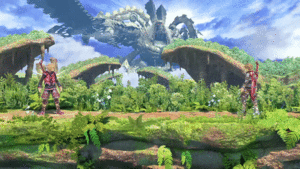 Browsing to select an art in Ultimate. | |
| User | Shulk |
| Universe | Xenoblade Chronicles |
Monado Arts (モナドアーツ, Monado Arts) is Shulk's neutral special move.
Overview[edit]
Shulk has access to five Arts: Jump, Speed, Shield, Buster, and Smash. They provide passive buffs, altering Shulk's attributes. Only one can be active at a time.
Each of the five Arts is indicated by a colored kanji character. When the special button is pressed, a character will appear behind him, beginning with Jump and following the order of Speed, Shield, Buster, and Smash for each consecutive button press. In Super Smash Bros. Ultimate, Arts can also be "quick-selected" by holding down the special button, moving the directional stick to the Art, then releasing the special button. While an Art is active, several of Shulk's attributes are modified for the duration of its effect, which vary based on the Art chosen.
| Kanji | Monado Art | Color | Affected stats | Activation pose |
|---|---|---|---|---|
| 翔* | Jump (ジャンプ) | Green |
Monado Jump greatly improves aerial mobility at the cost of lowered defense. It improves air speed, air acceleration, and jump height, and increases the upwards travel distance of Air Slash. With Jump active, Shulk's recovery and edgeguarding both become far stronger. He can recover from a much greater distance, and equivalently, he can go further offstage to chase opponents. Higher air mobility helps with both evading edgeguard attempts when recovering, and chasing down his opponents' evasion attempts when edgeguarding. Jump also improves Shulk's combos: in general, he is much more able to quickly follow opponents after launching them away. (For example, in Smash 4, an up throw followed by an up aerial can become a 50-50; this setup is known as the Monado Purge). Jump's great strengths come with high risk: its has more severe damage vulnerability than any other Art. However, because it increases gravity, it marginally improves his survivability against vertical attacks. In Ultimate, this Art lasts for 6 seconds with a cooldown time of 18 seconds. |
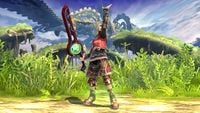 Holds his hand in the air |
| 疾* | Speed (スピード) | Blue |
An Art that improves Shulk's approach and spacing options, short hops, and overall combo ability, but lowers his overall damage output. More efficient short hops allow Shulk to space much more effectively, and a better approach speed makes this Art a good combo starter against slower characters. Decreased damage means more attacks have to land to compensate for the speed boost, but Speed's overall mobility allows the player to trap opponents with barrages of covering short-hop aerial attacks, approach quickly to punish with a grab, as well as weave in-and-out of attacks in order to bait reactions. Lowered traction significantly improves his pivot grab range (becoming the third longest in the game, tied with Meta Knight), but it also leaves him highly punishable when coming to a stop. Lowered jump height can be an issue if recovering vertically, but the speed boost applies to Shulk's air speed as well, allowing him to quickly get close to the stage before either getting in the proper distance/height for Air Slash to sweetspot the ledge, or changing to Jump to help his recovery. Like Jump, the Speed Art can initiate a Fair Slash combo at certain percentages. In Ultimate, this Art lasts for 8 seconds with a cooldown time of 16 seconds. |
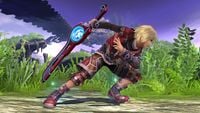 Leans forward, ready to run |
| 盾 | Shield (シールド) | Yellow |
An Art focused on defense and survivability, but it cripples movement speed, damage output, and recovery. Monado Shield is considerably useful to retain a percentage lead or stall matches, as Shulk can survive to extreme percentages. The reduced knockback disrupts enemies' usual combos. Monado Shield also increases Shulk's shield health, making it more much more durable and difficult to break under normal circumstances unless it was already small when the Art was activated; with Monado Shield active, Shulk's shield is able to withstand normally shield-breaking attacks such as a fully-charged Shield Breaker or both hits of Bowser Bomb, provided it is at full health. As this Art reduces knockback, it has some beneficial gimmicks in certain situations, such as being able to airdodge out of Mewtwo's forward throw at low percents, and reducing the amount of time Shulk gets stunned by Disable even at high percents. Shield's reduced damage and mobility makes it difficult to gain a percentage lead, but this is compensated by Shield reducing damage and knockback taken, allowing Shulk to chip at cornered opponents with a lower concern of damage taken, while even being capable of escaping percent-specific combos. However, it is highly advised to switch out of Shield while recovering, as it significantly hinders his aerial movement. In Ultimate, this Art lasts for up to 6 seconds with a cooldown time of 18 seconds. Taking damage while in this mode will shorten its duration. |
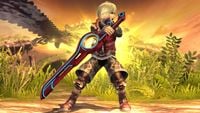 Crosses his arms in a defensive pose |
| 斬* | Buster (バスター) | Purple |
An Art that allows Shulk to deal high damage in a short amount of time while lowering his KO power and damage defense. His throws open up highly-damaging combo opportunities (especially on heavyweights), and the increase in damage output also makes his attacks deal increased shieldstun and shield damage, making him less prone to shield grabs and allows him to more easily break shields. A notable shield break combo is a MALLC back air into reversed forward smash. However, his KO power becomes extremely low, and this Art makes Shulk incredibly vulnerable to damage, which can easily send his percentage up significantly if he is careless, discouraging reckless use. In Ultimate, this Art lasts for 10 seconds with a cooldown time of 14 seconds, giving it both the longest duration and shortest cooldown time of all five Arts. |
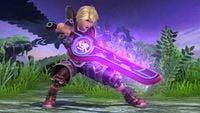 Holds the Monado in front of him, much like his down taunt |
| 撃* | Smash (スマッシュ) | Red |
An Art used to improve Shulk's KO options and edgeguarding potential, which reduces Shulk's damage output, but also makes most of his moves viable KO moves at under 100%. For example, his smash attacks can KO as early as 70% even when uncharged. Shulk's down throw also becomes the strongest down throw in Smash 4, while in Ultimate, his forward throw and back throw become one of the strongest. Smash also allows Shulk to mess up certain throw combos at lower percents (e.g. Sheik and Diddy Kong) by launching him slightly further than normal. However, due to the reduced damage, shieldstun and hitlag are reduced as well, and thus makes all of his attacks even more punishable on shield, while Shulk's survivability becomes as low as Mewtwo's for the Art's duration. In Ultimate, this Art lasts for 8 seconds with a cooldown time of 16 seconds. |
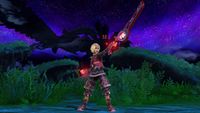 Points the Monado to the sky |
*Barring "shield", all of the Japanese kanji are stylized in different English translations than what they actually translate to.
When an Art is activated, colored auras appear in areas of Shulk's body that pertain to the effect of the Art itself. For example, Jump and Speed have an aura around Shulk's shoes, while Buster's aura will appear around the Monado. Shield's aura will appear around Shulk's body and Smash's aura appears around Shulk's hands. Also, in the Wii U version, the Art's kanji appears at the top left corner of Shulk's portrait (which blinks faster and faster when the Art is almost ready to deactivate), and Shulk additionally gains a colored trailing aura effect while he moves.
Also, for all Arts in the Japanese version, Shulk yells out for each respective one: 跳ぶ! (Leap!), 走る! (Run!), 守る! (Protect/Defend!), 叩く! (Thrash!), ふっ飛ばす! (Fly away!)
Activation, duration and effects[edit]
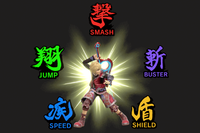
To activate an Art, the special button must not be pressed for a few frames until the colored aura appears on Shulk. While scrolling through the Arts, he will be unable to perform any other special moves until one is activated, although Shulk can still move, dodge and attack normally. In Ultimate, it can also be "quick-selected" by holding down the special button, holding the directional stick mapped to the Art, then releasing the special key. The "quick select" wheel is mapped to the following: up for Smash, upper left for Jump, lower left for Speed, upper right for Buster, and lower right for Shield. If Shulk activates an Art while staying still, he poses and announces the activated Art's name upon activation.
In SSB4, each Art lasts for 15 seconds before stats return to normal. In Ultimate, all Arts last for less time, with Buster lasting for 10 seconds, Speed and Smash lasting for 8 seconds, and Jump and Shield lasting for only 6 seconds (with Shield Art's duration also draining a slight amount every time Shulk gets hit while the Art is active). The Arts can be cancelled by pressing the special button three times in succession, or, in SSB4, by holding down the special button for about one full second. Additionally, they will be canceled instantly when the user is hit by the initial rush of All-Out Attack. In SSB4, once an Art activates or is canceled early, it cannot be activated again until 10 seconds have passed. In Ultimate, each Art has its own cooldown time, with Jump and Shield taking 18 seconds, Speed and Smash taking 16 seconds, and Buster taking 14 seconds. Before then, its corresponding kanji will be grayed out when selecting another Art. The cooldown on all Monado Arts resets when Shulk is knocked out. No two Monado Arts can run at the same time; if one is active, and a different Art is chosen, the previous Art is overwritten and enters cooldown.
Each Monado Art also affects Shulk's attacking power with battering items like the Beam Sword (e.g. Smash reduces hitlag and damage while increasing knockback). However, they do not affect firing weapons like the Ray Gun or thrown items such as the Capsule.
Shulk's Final Smash, Chain Attack, is also affected by the Monado Arts. With Buster, this attack becomes highly damaging, often sending the opponent into KO percents if the Art lasts the duration of the full attack, but cannot KO as effectively. With Smash, Shulk can KO at significantly earlier percents but, should the attack not clear the stock, Shulk will have hardly done as much damage to the opponent as desired, making it arguably riskier than with Buster. Speed and Shield will only reduce its effectiveness while Jump has no effect whatsoever. The Arts can run out in the middle of the Final Smash, so awareness of their durations and the situation is advised. In addition, the neutral special input will activate the Final Smash, and thus the desired Art to use during Chain Attack must be chosen beforehand. However, Monado Arts can be accessed even with a Final Smash on standby; Shulk must hold the button down while in aerial landing lag.
Instructional quotes[edit]
| Press | ||
| Switches Arts—each has a different advantage. Can be switched by holding or pressing repeatedly. |
Technical data[edit]
Arts can be cancelled, scrolled through, or changed several frames after hitstun occurs, and can be buffer-canceled during an action such as a throw, jump, landing lag and landing from helplessness.
The animation of Shulk announcing the Art's name grants 14 frames of intangibility (unless canceled into another action), and Shulk will perfect shield any attack that connects with his body during that period should he raise his shield. It will also replace landing lag animations (reducing it to 5 frames). These factors make it possible to perform multiple advanced techniques, most notably the Monado Art landing lag cancel.
Kirby's Copy Ability[edit]
Kirby is able to copy the Monado Arts with his Inhale and can receive effects from these Arts when he uses this Copy Ability. This can give Kirby incredible benefits and new previously-unseen options, as Jump gives him high jumps that can easily pass the upper blast line after three jumps and, as a result, can extend his throw combos to pursue his opponent. Buster can trap opponents in a string of attacks far past realistic KO percentages; particularly his up tilt which can juggle most characters for longer than usual to rack up large amounts of damage. Speed also gives Kirby the longest perfect pivot in the game. Conversely, both Speed and Shield make Kirby's jumps the most ineffective in the game, and Smash makes him the lightest fighter in the game. And unlike Shulk, Kirby's up special moves gain no benefit from the Jump Art.
Like Shulk, Kirby's Ultra Sword Final Smash can be affected by the Monado Arts in all of their respective ways to alter its damage and knockback properties. Despite having his own version of the Monado, Kirby does not use it to directly attack his opponent whatsoever, nor does he gain a unique hat from it.
Even though Kirby's Monado Arts only gives him massive versatility against a Shulk in 1v1 matches, a Kirby/Shulk team in Doubles with Team Attack turned on can easily allow both characters to use such versatile techniques in tandem.
Customization[edit]
Special Move customization was added in Super Smash Bros. 4. These are the variations:
| 1. Monado Arts | 2. Decisive Monado Arts | 3. Hyper Monado Arts |
|---|---|---|
| "Activate one of five different Arts, each of which provides a different advantage." | "Activate stronger Arts that last longer. However, they can't be canceled once used." | "Your arts are much stronger, but the drawbacks are too. Doesn't last as long." |
- Monado Arts: Default.
- Decisive Monado Arts: Arts last for 5 more seconds, recharge 5 seconds sooner, and boosts positive effects of Arts, but once an Art is activated, it cannot be canceled or changed for another Art. A slightly longer pause is added before an Art becomes active, allowing the user to consider whether they want to be temporarily stuck with an Art. This allows the user to take advantage of a specific art for much longer, at the cost of the inability to switch Arts once it becomes disadvantageous. As a side effect, the inability to change Arts also prevents effective usage of Art-based techniques, namely the ones mentioned in the section above.
- Hyper Monado Arts: Both positive and negative effects of Arts are amplified, but the Arts have a shorter duration of 5 seconds. Recharging will also take 5 seconds longer. Becomes a short-duration, high risk and reward ability, as the strengths and weaknesses of each Art become some of the most extreme in the game: an example is Hyper Buster, which makes Shulk's moves immensely more damaging than even Ganondorf's, but reduces his KO power to almost nothing even at high percents.
Techniques[edit]
Shulks's Monado Arts, while simple in execution, holds numerous advanced techniques. These tend to make use of the activation and deactivation animations for expanded movement options that make attacks and approaching safer. These techniques all have unique uses and execution, although they vary in viability. Monado Arts' advanced techniques are a mainstay in Shulk's metagame for their strong reward if executed in the right situation, such as speed boosts, intangibility, and relatively easy rushdown capabilities in game state. However, if executed poorly, they may have severe consequences due to the drawbacks of certain Monado Arts leaving Shulk vulnerable while active. Via copy ability, Kirby is able to make use of all Monado Art advanced techniques as well.
Some techniques are exclusive to or work differently in Smash 4, as the engine differences and Shulk-specific changes in the transition to Ultimate made these techniques impossible. These game-exclusive techniques will be labeled when appropriate.
Buffered deactivation[edit]
Buffered deactivation (often shortened to BD) is a technique that allows Shulk to exploit unique interactions caused by the deactivation of a Monado Art between moves, such as transitioning speeds between Arts, enabling combos that would not otherwise be possible, or enhancing existing combos. By pressing neutral special three times to deactivate Shulk's current Art and timing the third press so that it occurs at least 30 frames before Shulk is in a state where he can cycle Monado Arts, the Art will deactivate the moment Shulk is in a cyclable state.
In both Smash 4 and Ultimate, buffered deactivation allows Shulk to situationally optimize certain combos, increasing their effectiveness. For example, by turning off Buster Art (or Shield Art in Ultimate) during a combo, the next move will be performed without Buster Art active, which will increase its knockback significantly, potentially making attacks that are unsafe on hit safer or turning the combo into a kill confirm. Similarly, Shulk can deactivate Speed Art or Shield Art after landing a combo starter to deactivate the Art's reduced damage output, increasing the combo's damage overall. Turning off Shield Art can also allow for some combos that wouldn't otherwise be possible by nullifying the speed reduction of the Art, allowing for greater reach.
Buffered deactivation can also be used to enhance Shulk's jump height if Monado Jump is deactivated as Shulk jumps. This is due to Shulk keeping Monado Jump's increased jump height, but not the increased falling speed, causing him to travel higher and stay in the air longer. This allows Shulk greater reach and increased air time when edge guarding or chasing opponents into the air. In Smash 4, this technique can boost the height of any jump, and is pivotal for the Monado Purge 50/50 setup (up throw to jumping up aerial), as the extra height extends the setup's effective percent range. Though the technique also works in Ultimate, deactivating Jump Art during the early frames of a full hop will fail to change the jump's properties (due to all changes being overwritten by the full hop's own natural jump boost).
In Smash 4, buffered deactivation (previously known as Monado Art buffered deactivation or MABD) allows Shulk to retain his jumping, walking and/or running speed immediately after canceling an Art. Buffered deactivation was originally discovered by Erico9001, who also researched that it boosts Shulk's jump height here. Performing this requires the player to buffer-cancel an active Monado Art during an uninterruptible animation (i.e dropping shield or dodging), while also buffering a movement option during that time. If successful, the Art will cancel, but Shulk will technically begin moving before the Art disappears, causing him to gain the increased movement speed that is provided by the Art until another command is inputted. However, any movement speed gained will slowly change back to the default speed after a while: in the case of running, Shulk will initially start at the speed of Monado Speed or Monado Shield and then either slow down or speed up, respectively. The effect will last until Shulk does another action, such as an attack. This has several uses, including fakeouts or doing attacks/combos that requires Monado Speed's mobility without being penalized by its lower damage. In Ultimate, the bug which allowed Shulk's movement properties to transfer through deactivation was removed (Shulk will now immediately change all his attributes the instant he switches or deactivates an Art).
Dial storage[edit]
Dial storage is an Ultimate exclusive advanced technique which allows Shulk to bypass up to 10 frames of startup lag when using the Monado Arts dial wheel. It is named as such due to a technical quirk that allows the initial frames of the Monado dial to be "stored up" before its next use, much like a charge move.
To use dial storage, the player must hold the special button while in a chargeable state (ie: while idle, during landing lag, or in hitstun) and release the button or interrupt the charge with an attack, grab, jump squat, or a taunt before the Monado Art dial activates. This will pause the charge, storing however many frames the dial was charged for. (A "flash" effect around Shulk's torso can be used as a visual aid to see how many frames were charged.) Though starting to charge again while in a chargeable state or successfully opening the Monado Art dial resets the current charge, buffering the dial charge out of an unchargeable state (ie: any action that prevents Shulk from switching Arts) or during an action’s interruptibility frames allows Shulk to access that stored charge, resuming the charge from where he left off.
If done correctly, Shulk's next use of the Monado Art dial will have its startup lag reduced by however many frames were charged in advance. As the dial appears at frame 11, this technique can cut out up to 10 frames from the time it takes to open the dial, with a maximum of having no startup frames at all when all 10 frames are charged up. Using dial storage, Shulk can open the dial instantly, allowing him to reduce the landing lag of an aerial attack or airdodge to as low as 7 frames (by flashing the dial without selecting an Art), switch Arts almost instantly (gaining up to 14 frames of intangibility), escape or switch to Shield Art during certain multi-moves, or use a directional air dodge as an escape or movement option with minimal landing lag. These situations may otherwise be impossible to escape from when using the standard dial switch (which has 11 frames of startup lag). Dial storage can also be used to switch Arts almost immediately between combo hits, allowing a wide variety of transitional combos between different Arts; this includes potent KO combos like leading Buster Art moves into Smash Art finishers, or mid-combo Art switches that extend strings with boosted mobility and/or increased damage.
Freely charging the dial (ie: charging without a timed setup) can quickly prepare dial storage for use on the fly, which can be done while cycling or deactivating Monado Arts, before attacking, or slipped in after an Art activates. Landing with a forward aerial or a neutral air dodge while holding the special button and buffering an input during landing lag to interrupt the charge can also be used as a practical setup to guarantee a maximum dial charge, buffering the charge during those moves' 10 frames of landing lag.
This technique can be used much like Shulk's Monado Art landing lag cancel. However, the applications of this technique are far more versatile and can be used more aggressively, mostly due to the reduced utility of MALLC. In comparison, dial storage is more flexible as it doesn't require airtime nor a timed landing, and can be used in any Art (MALLC requires no Arts to be active). However, MALLC has no vulnerability when landing (dial storage suffers from 3 frames of vulnerability during the "fuzzy window" which allows Arts to be chosen). Overall, both techniques can be used for different situations.
Shulk with a "stored" dial, using it to instantly switch to the Shield Art in order to weaken the second hit of Zero Suit Samus' forward smash.
Monado Art intangible landing[edit]
Monado Art intangible landing (often shortened to MAIL) is an advanced technique that uses the activation of a Monado Art to give Shulk an intangible, lagless landing without any soft or hard landing lag. Performing this technique simply requires Shulk to activate a Monado Art during an empty hop. Applications include punishing shielding opponents (since they will tend to shield due to Shulk's aerial pressure) or phasing through anti-air attacks to land; the latter allows Shulk to put up his shield instantly.
Monado Art landing lag cancel[edit]
The Monado Art landing lag cancel (often shortened to MALLC) is an advanced technique that allows Shulk to remove part of the landing lag of his aerials or air dodge by using the animations from selecting Monado Arts, which lets him apply safer pressure with his aerials, escape from juggles, perform longer combos or strings, and even take advantage of the few frames of intangibility during art activation to land safely onto stage. Erico9001 first explained the timings of MALLC in his YouTube guide. Later, Jerm provided a more in-depth video guide on the timings and added details of the technique. Finally, Paradigm/Erico9001 uploaded a video providing the exact frames to successful Art cancel different moves on varying stages with their video guide.
To perform the technique, the player should start the activation of any Monado Art while in midair, use an aerial attack, and land with the aerial just before the Art fully activates. Shulk performs a pose after any Art activates (provided he isn't in a non landing lag animation), and this pose will replace the landing lag animation. The pose can be immediately canceled as if Shulk is standing still, allowing him to bypass the landing lag of his aerials and use any other action. As Shulk cannot act out of an Art's pose for 6 frames, this technique does not fully eliminate landing lag, but reduces it significantly. This technique allows Shulk to make use of the 14 frames of intangibility gained right when he poses. Simply doing nothing leads to the longest possible intangible window (14 frames), while buffering an option allows Shulk to act out earlier at the cost of having a smaller window of intangibility (only 6 frames). MALLC's timings are affected by what the player hits: if Shulk misses or clashes against a shield (even if perfect shielded), he will cancel successfully, but if Shulk hits an opponent, it will cause more hitlag and cause him to land slightly later, making the Art activate during hitlag and failing the MALLC.
This technique is most beneficial in Smash 4, due to Shulk's aerials having high landing lag; the lag reduction allows Shulk's high-ranged aerials to space more effectively, and makes him less open when attacking against shields. This technique also grants intangibility, which can act as a controllable and interruptible pseudo-sidestep, granting him a chance to dodge possible punishes from his opponents. If Shulk puts up their shield during these 14 frames, it will always be a perfect shield. Finally, it gives Shulk an accessible B-reverse while in midair, which gives opportunities for unique combos or a quick getaway. However, MALLC is used sparingly in top-level play due to the benefits of having an active Art, and is generally used as a mix-up option.
MALLC sees much less use in Ultimate due to the existence of dial storage and due to Shulk's landing lag being significantly reduced, which mostly eliminates the need of reducing his lag further. Monado Arts (selected manually instead of the dial wheel) also activate significantly faster, which heavily changes MALLC timings across the two games. The new dial method for selecting Arts also allows Shulk to access the brief intangibility from changing Arts at any moment. Due to offering greater flexibility and less commitment in terms of Art activation, MALLC's usage has mostly been replaced by dial storage's land cancel. However, unlike with dial storage, a well-timed MALLC allows Shulk's landing lag to be cancelled by the Art activation pose instantly (as opposed to dial storage's minimum 3 frames of "fuzzy window" startup lag before the Art's activation).
All his aerials have varying benefits from MALLC: back aerial benefits the most from this, as it suffers from high landing lag while having the longest range and good KO power. Neutral aerial and forward aerial benefit slightly less due to their speed, while up aerial and down aerial benefit the least, since connecting both hits of these moves cause too much hitlag to land at the correct time.
These are examples of some MALLC timing setups in Smash 4:
- Short-hop forward/back aerial, Art activated at peak of jump, only cancels on hit.
- Short-hop up/down aerial (second hit), Art activated after jumping, only cancels if the second hit (the blade beam) connects, as hitting both hits cause too much hitstun.
- Full-hop to fast-fall aerial, Art activated after jumping, only cancels if whiffed.
- Full-hop to fast-fall neutral/up aerial (second hit), Art activated at peak of jump, always cancels
- Revival platform drop to back aerial, Art activated immediately after dropping, allows for a simple back air cancel on certain stages.
Due to the changes to shield mechanics made in version 1.1.1 of Smash 4, cancelling a back air into Buster, and immediately following with a forward smash can instantly break a full-health shield without giving the target a chance to drop shield, provided the initial attack isn't perfect shielded, or aimed at another Shulk or Kirby with the Shield Art active.
While Kirby can enhance his combo game with MALLC in theory, he benefits less due to his already fast attacks. Like Shulk, Kirby's down aerial suffers from significantly higher hitlag akin to his up and down aerials, making it the least optimal aerial for the technique. However, due to his quicker aerials and different aerial movement speeds, Kirby's timings for the MALLC vary a lot more, though the general principle is the same.
Monado Art ledge snap[edit]
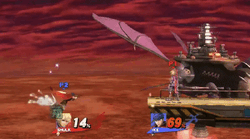
The Monado Art ledge snap (often shortened to MALS) is an advanced technique that allows the user to laglessly get up from their ledge hanging animation, with the added benefit of the Art activation's intangibility. This allows Shulk to both quickly return onto stage as well as avoid certain ledge traps, such as R.O.B.'s Gyro. MALS was first discovered and explained by GetShulked, and researched on by Paradigm.
The technique is performed by cycling to an art prior to grabbing the ledge, dropping from the ledge, and double jumping onto the stage as the Art is activating. The Art's activation pose effectively 'clips' Shulk through the ledge as his hurtbox suddenly changes shape, forcing the game to snap him onto the stage. While difficult to time, this technique provides a much faster get-up option for Shulk compared to simply using a standard get-up from ledge. Aside from avoiding ledge traps, MALS can also be used offensively after a ledge trump to immediately return onto stage, allowing Shulk to perform a strong punish regardless of the opponent's actions.
The timing varies depending on the Monado Art being activated; for example, the window of success for a Monado Jump ledge snap is the largest, while the timing for Monado Smash is much harder to do consistently.
The technique cannot be performed on all stages. Of the legal (or formerly legal) stages of Smash 4 and Ultimate, it can be performed on:
- Battlefield, Smashville, Town and City, Umbra Clock Tower, the last transformation of Castle Siege
- The Ω forms of Battlefield, Umbra Clock Tower, Castle Siege, Midgar, Luigi's Mansion, Jungle Hijinxs, Skyloft, Temple, Halberd, Kalos Pokémon League, Pokémon Stadium 2, Onett, Gamer, Boxing Ring, Duck Hunt, Windy Hill Zone, and Suzaku Castle.
Monado Art run cancel[edit]
The Monado Art run cancel (often shortened to MARC), is a technique that is essentially a dash cancel using Monado Arts. Though clips of the tech had been seen prior, MARC was first explained by Catalyst. It uses the activation of an Art to negate the ending lag/braking animation of the character's run in order to instantly change their running direction, or to perform tilts immediately out of a run. This allows the user to weave in and out to bait options and punish them, such as baiting out a jump and punishing with an instant up-tilt out of the MARC.
In Ultimate, the universal changes to running eliminates the need for this technique during a run, though the intangibility frames granted by the Monado Art activation pose grant it a situational use as an advancing dodge. However, it has seen resurgence as a microspacing option, using the Art activation pose or the opening of the Monado Art wheel to cancel Shulk's initial dash.
Monado deactivated Art-canceled up smash[edit]
The Monado deactivated Art-canceled up smash (often shortened to MonaDACUS), is a Smash 4 exclusive technique that acts similarly to the DACUS technique in Brawl (as referenced by the name), using the buffered deactivation technique. However, it is extremely situational and hence almost useless in actual play. The technique was originally discovered by Erico9001, and was further refined by Apathy. The technique was previously referred to by the placeholder name Speed Art buffered deactivation jump-cancelled up smash (often shortened to SABDJCUS or sad bus).[1] This name quickly gained notoriety due to its sheer length, and became memetic within the Smash community, especially when used to describe any of Shulk's advanced techniques.
By canceling out of the Speed Art during an animation where Shulk can buffer an Art deactivation, Shulk will keep his increased ground speed for a few frames while losing Speed's increased ground friction, allowing him to slide even further and punish opponents with a jump-canceled up smash. This helps Shulk hit opponents that he usually wouldn't be able to reach. As the technique also involves canceling the Speed Art, it also deals more damage compared to staying in Speed Art and up smashing, as Speed reduces damage output. It should be noted that this technique gains almost no distance without a jump-canceled up smash.
In Ultimate, this technique was removed, since it relied on buffered deactivation's momentum-shifting properties to be performed (which has been patched out indirectly).
Infinite Monado Arts glitch[edit]
The Infinite Monado Arts glitch was a glitch in both Smash 4 and Ultimate which allowed Shulk to retain every effect of Monado Arts at once. In Smash 4 it involved Shulk's currently-active Monado Art expiring while trapped by Yoshi's Egg Lay, while in Ultimate it involved Shulk being hit by King K. Rool's Blast-O-Matic, timed so that his currently-active Monado Art expires between the second (laser) and third (launching) hits. When done correctly, Shulk would have no visible effects of any Arts, but all five of them would be active at once, mixing any overlapping properties together. In Ultimate, the glitch also incurred RCO lag where if any aerial move is used during the glitch, the landing lag would last much longer than normal. The glitch also worked for Kirby, if Kirby inhaled Shulk with the Monado Art. The only way to remove the glitch was to self-destruct or use a transformation item.
In Smash 4, the glitch was fixed in version 1.0.4 on 3DS, and in version 1.0.6 on Wii U. In Ultimate, the glitch was fixed in version 2.0.0.
Origin[edit]
In Xenoblade Chronicles, all special attacks and abilities are categorized as Battle Arts, and the term is used as such to describe both playable and enemy character abilities. The wielder of the Monado has access to two additional Arts that are accessed by using their signature ability (or "Talent Art"), "Activate Monado", with more being unlocked as the story progresses for an ending total of eight, three of which return for Super Smash Bros. Unlike what Smash Bros. depicts, not all Monado Arts are buff-type moves, as several are status-inducing skills or powerful attacks. In addition, two Monado Arts, Jump and Smash, were tailor-made for the Smash Bros. series and as such do not exist in the original game.
- Monado Buster is one of the two Arts available from the start, acting as a single powerful slash attack with an extended purplish beam that deals additional damage to Mechon (the antagonists of the game, which cannot be damaged by normal weapons without support from the Monado). The Smash behavior of raising attack power is more akin to Monado Enchant (both ability and color-wise), the other starting Art which improves damage and allows other party members' normal weapons to damage Mechon. Buster's original color is blue in its game of origin.
- Monado Shield creates a barrier around all three party members that blocks a single enemy's Talent Art, as long as Shulk has upgraded the Art to a level that matches or exceeds the enemy's Art. The Smash behavior of decreasing damage taken is more akin to Monado Armour, an Art that raises the party's defenses.
- Monado Speed greatly increases the agility of one party member, raising both accuracy and evasion for physical attacks. This is somewhat modified for Smash, as it gives Shulk increased movement speed instead of evasion and accuracy. This more closely resembles the Art's debut cutscene in Xenoblade, where Shulk uses it to save Sharla from a Mechon attack by enabling her to run at superhuman speed. While the Art in Smash does not grant an actual "evasion" stat, its attributes are reflected by giving Shulk much more agility, making dodging and moving much easier, which mimics the increased evasion in Xenoblade.
- As mentioned above, the Jump and Smash Arts are unique to Smash, although both use a color that matches an existing Art in his origin game:
- Jump uses the green shade of Monado Purge (or "Monado Breaker" in Japanese), which applies a status called "Aura Seal" on opponents, removing any existing auras and preventing them from activating any auras or spike abilities for the duration. Coincidentally, Shulk does a jump before activating the Art in his origin game.
- Smash uses a lighter shade of red of Monado Eater, an Art that removes enemy buffs and inflicts Bleed on victims, causing damage over time.
Battle Arts in Xenoblade Chronicles have cooldown times, with different Arts having differing cooldown times. However, this only applies to Battle Arts; Monado Arts are part of Shulk's Talent Art, "Activate Monado", and instead require Shulk to use part of his Talent Gauge to activate them, which Shulk can refill by using auto attacks, Stream Edge, or Battle Soul.
Gallery[edit]
Activating the Smash Art in Super Smash Bros. for Wii U.
Monado Arts as shown by the Move List in Ultimate.
Names in other languages[edit]
Trivia[edit]
- This is the only neutral special move that cannot be performed while on a revival platform and the only special move that cannot be performed from a revival platform that can be performed in the air.
- Monado Arts is the only neutral special Kirby can copy which can affect a move other than his neutral special.
- Monado Arts effects do not affect projectiles. While Shulk is not affected by this, Kirby is and so are items used by them which generate projectiles.
- Winged Pikmin and Monado Arts are the only special moves to have custom variations that also cannot deal damage.
- Although subtle, each Monado Art has its own separate activation sound.
- The images of the Arts will always face the camera horizontally, but not vertically, unlike most effects.
- The attribute effects of Monado Arts reach several extremes:
- The Hyper Jump Art gives Shulk the fastest air speed of all fighters, surpassing even Giga Mac's air speed.
- The Hyper Speed Art gives Shulk the fastest walk speed of all fighters, walking faster than Little Mac's run speed.
- The Hyper Shield Art gives Shulk the lowest walk speed and run speed of all fighters in Super Smash Bros. 4, with his run speed being slower than Ganondorf's walk speed.
- In terms of knockback, Hyper Monado Arts gives Shulk the most knockback resistance, makes his throws the strongest in-game while in the Smash Art and gives him the hardest-hitting counter if in Hyper Smash while using Power Vision, with power only rivaled by Lucario's Double Team at maximum Aura.
- Kirby becomes the lightest character in SSB4 with the Smash Art activated, as well as the character with the longest vertical recovery with the Jump Art, surpassing even Villager's.
- Also, when using the Shield Art, Kirby has the lowest air speed of all fighters, being slower than even Shulk's Hyper Shield Art air speed value.
- While most of Shulk's Monado Art poses are unique to Smash 4, he uses a pose reminiscent of the Shadow Eye Art from Xenoblade Chronicles when activating Speed.
- Even if Shulk is KO'd while selecting Arts, the sound effect of his last selected Art being activated will play after his KO sounds.
- In Smash 4, Shulk's mobility does not reset when an Art expires unless he lets go of a directional key, meaning that he will keep his high dash speed even when the Speed Art expires so long as he keeps dashing and no increased air speed is granted if Shulk holds down the forward key and switches from the Shield Art to the Jump Art. This was fixed in Ultimate.
